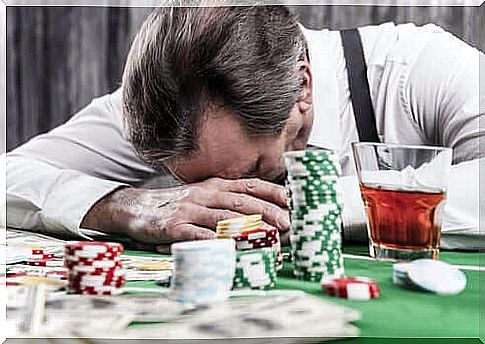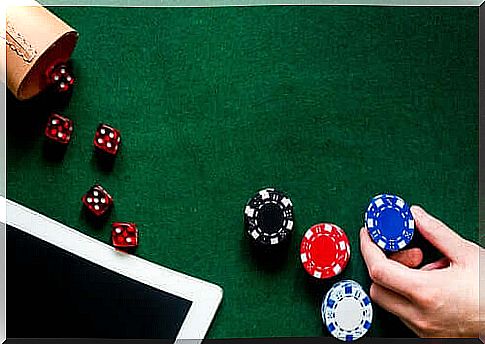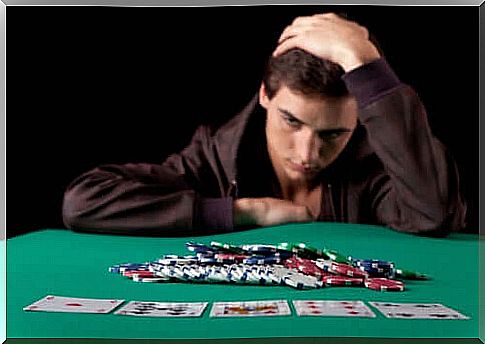Cognitive Distortions In Compulsive Gamblers

Cognitive distortions are biased cognitive treatments that manifest themselves very frequently. They are all the more common in patients with mental disorders (in compulsive gamblers for example). In fact, cognitive distortions are very often the root cause of the disorder or correspond to the nutrients that feed it.
Play is one of the most primitive activities there is. In the history of mankind, it is known that some very famous people were obsessed with the game. Emperor Claudius, Dostoyevsky or adventurer Casanova are good examples of this observation.
When we talk about gambling from a pathological point of view, we are referring to forms of gambling that involve chance. Video games would therefore not fall into this category even if we know that they cause, at the same level, a type of addiction.
According to diagnostic manuals, pathological gambling to which we are going to refer is characterized by a loss of control over gambling and by the development of an addictive relationship. The affected patient will continue to play while being aware that this activity has negative consequences.
The classification of pathological gambling has changed. Previously, this disorder was considered an impulse control disorder. Today and because of its characteristics, it is considered by the DSM-V as an addictive disorder.

Cognitive biases in the player
Pathological gamblers adopt certain irrational beliefs or cognitive distortions that cause them to get bogged down in their gambling addiction.
Cognitive distortions are the biases we commit when we process information. They are not necessarily pathological. Indeed, we all develop them to a greater or lesser extent. However, it is important to act on these distortions when they become too frequent and they prevent us from moving forward. The typical distortions of pathological gamblers are as follows:
- Illusion of Control : This is the belief that the results of gambling depend on personal activity more than chance. The individual is convinced that he is able to control the games and their results. For example, a pathological gambler may say to himself “I have a foolproof method of winning”. It is a bias that he ends up believing. Therefore and logically, he continues to play
- Fixation on absolute frequencies: the individual measures gambling success by focusing only on the winnings obtained without referring to the losses. It is normal for the pathological gambler to lose much more than what he wins. However, this bias protects him from reality and keeps him in the addiction phase.
- Superstitions and illusory correlations: these are accidental associations between a certain event or behavior and a reward. The player therefore ends up believing that the event in itself increases the probability of winning. Wearing an amulet or performing a specific ritual are similar approaches. These are obviously magical thoughts, since we know that the pathological player is unable to control victory or loss with their actions. An example of such a bias could be the following statement “If I roll the dice backwards, I get more points”
- Machine personification: Some pathological gamers assign animated characteristics to machines or objects they play with. A patient could therefore say to himself “The machine is playing a bad trick on me, it is trying to deceive me but it will not succeed. I know his little number ”
How to help players overcome their cognitive distortions?
First, it is essential that the pathological player be aware of the distortion. Cognitive biases are not easy to detect because they become automatic over the long term. A good way to identify them is to ask the gamopath patient to make a recording when he feels the urge to play rising in him. If we explain to him correctly how to proceed, he will realize the cognitive distortions he is used to making.
To do this, we can present to him the biases most commonly committed by patients with ludopathy and ask him to identify those that concern him the most. Once this step is taken, it is essential that the individual understands that these cognitive distortions are largely responsible for their gambling addiction.

To have an action on the distortions, it is important to question them and to modify them by basing your reasoning on objectivity and reality. This is done by applying Socratic questioning and Guided Discovery. The patient questions the evidence or evidence at his disposal to maintain this reasoning. “ How can I be so sure that my method is foolproof? “,“ Is the gain or loss really up to me? “,“ What is the proof? “, Etc.
By practicing Socratic dialogue with himself and becoming aware of his filtering errors, the individual will be more willing to change his way of thinking. To do this, he must review all the questions he has asked himself beforehand. And produce a rational response which will then become his mental mantra. For example: “I don’t have control over a machine that works by chance”, “I have sometimes won, but the data shows me that I mostly lost. It does not compensate ”.
With practice, the player realizes the pointlessness of his behavior. He understands that his problem only generates new economic, family or professional problems. Thus, the person should eventually lose interest, and thus quit the game.










